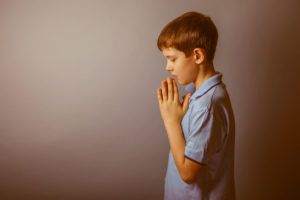Kentucky’s Day of Prayer: Another Version of Thoughts and Prayers Instead of Gun Control?

When more than a million people marched across our nation on March 24 with the message that thoughts and prayers were not enough, one would think that collective voice could be heard even in Kentucky. But apparently not. Kentucky is in the process of passing House Bill 40, which aspires to establish the last Wednesday in September as “A Day of Prayer for Kentucky’s Students.”
“Given all that our students are facing,” notes the bill’s sponsor, Republican Rep. Regina Huff, “[they] need to know that we are standing with them. We all need to embrace this and be united in an effort of support in each individual’s manner of prayer for our schools, students and administrators.”
It’s not clear what “all that our students are facing,” denotes, but whether Huff was referring to drugs or active shooters or pregnancy or bullies, prayers are not going to help students face any of them any better.
Kentucky’s proposed Day of Prayer would coincide with the already problematic “See You at the Pole” day, an annual event where students gather around their school’s flag pole and engage in what is supposedly a student-sponsored and student-led prayer prior to the start of the school day. Besides the creepy aspect of children praying around our national flag, if students want to pray, why do they need a special day to do it? Aren’t they supposed to do it every day? Why can’t they pray before school on their own? Most would assume they’re doing that anyway. So, what’s the point in having a state-sanctioned day designated for something they already have the freedom and ability to do?
Proselytizing, of course. Public prayer gives religious students (and teachers) a chance to pull a few more new souls into heaven. As we’ve discussed here before, there are conditions the schools must abide by so they’re not technically breaking constitutional law. No school administrators, staff, or parents can be involved in organizing or participating in an event. The function must also take place before the start of the school day and cannot disrupt normal school activities. Rep. Huff has been careful to follow these same conditions in HB 40.
During his first year in office, Kentucky Governor Matt Bevin pronounced the last Wednesday of September as a Day of Prayer Over Students. Thankfully, because it’s a proclamation, either the governor or the current legislature must renew it annually (so we can hope that if and when a more constitutionally astute governor is elected such a ridiculous day would cease to be proclaimed). If HB 40 passes, however, it will codify an even worse day for Kentucky’s public school kids, regardless of who’s in the governor’s mansion.
Amber Duke, a spokeswoman for ACLU Kentucky, told the Herald-Leader that if the bill passes the Senate and is signed into law,
it should be made clear to our public schools that they should not be in the business of endorsing religious practices in violation of students’ constitutional rights. The content of the bill doesn’t mandate prayer, but as we’ve seen time and time again in the Commonwealth when it comes to religion and schools, what is intended by the General Assembly can be lost in translation when it reaches the local school level.
And therein lies the issue and the reason the Founding Fathers thought the Establishment Clause was so important to include in our constitution. Give the church an inch and they’ll take one thousand miles.
The other big question that the nontheist community is asking is: What about all the “nones”? Between 20 and 30 percent of Americans now identify as nones, and that number continues to grow. Advocates for the Day of Prayer for Kentucky’s Students say that if a student doesn’t want to pray, they don’t have to. But their state is acknowledging it; their schools are acknowledging it; their friends may be; their teachers may be also. Can we be certain that nontheist students would not be discriminated against if they chose to not participate in a state-sanctioned event? And worse, what if by not participating, especially in more rural areas, the student outed herself as a nontheist? How would that help nontheist students better face “all they are facing”?
HB 40 already passed the State House on a vote of 83-5 and will now go to the Senate for consideration. As Edna Chavez said in her March for Our Lives speech, “We should feel empowered and supported in our schools.” All of us, theists and nontheists alike. Let’s hope Kentucky allows the Establishment Clause to do what it was written to do: separate the church from the state.
